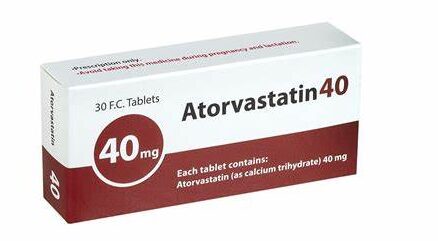
Atorvastatin, Uses, Side effects & drug interactions
Introduction to Atorvastatin
Atorvastatin is a widely prescribed medication belonging to a class of drugs known as statins. Statins are primarily used to lower cholesterol levels in the blood, reducing the risk of heart disease, stroke, and other cardiovascular problems.

atorvastatin-pharmacistsite.com
Drug Type:
Atorvastatin is classified as a HMG-CoA reductase inhibitor (also called a statin). It works by blocking the enzyme responsible for producing cholesterol in the liver, thereby lowering “bad” cholesterol (LDL) and increasing “good” cholesterol (HDL).
Uses of Atorvastatin:
Atorvastatin is commonly used to treat:
- High cholesterol (hyperlipidemia): Helps lower total cholesterol and LDL levels.
- Prevention of cardiovascular events: Reduces the risk of heart attacks, strokes, and angina in people at high risk.
- Heart disease management: Improves outcomes for patients with existing heart disease by preventing further complications.
Side Effects of Atorvastatin:
Like all medications, it can cause side effects. Common side effects include:
- Muscle pain or weakness
- Nausea or stomach upset
- Headache
- Diarrhea
- Liver enzyme abnormalities (seen in blood tests)
Serious side effects are rare but can include:
- Rhabdomyolysis (muscle breakdown leading to kidney problems)
- Liver damage
- Memory problems or confusion
Contraindications:
Atorvastatin should not be taken by individuals who:
- Are pregnant or breastfeeding.
- Have liver disease or significant liver damage.
- Are allergic to statins.
- Have a history of muscle disorders (e.g., myopathy).
Drug-Drug Interactions:
Atorvastatin can interact with several other medications, affecting its efficacy or increasing the risk of side effects. Some important interactions include:
- Other cholesterol-lowering drugs (e.g., fibrates, niacin): Can increase the risk of muscle problems.
- Antibiotics (e.g., clarithromycin, erythromycin): May raise drug levels in the blood, leading to side effects.
- Antifungal medications (e.g., itraconazole): Can also increase the risk of side effects.
- Cyclosporine: A strong interaction that can elevate the drug concentration in the blood , increasing the risk of serious side effects.
Conclusion:
Atorvastatin is a powerful and effective medication for managing high cholesterol and reducing the risk of cardiovascular diseases. However, like all medications, it comes with the potential for side effects and interactions. Always follow your healthcare provider’s instructions and report any unusual symptoms or concerns promptly